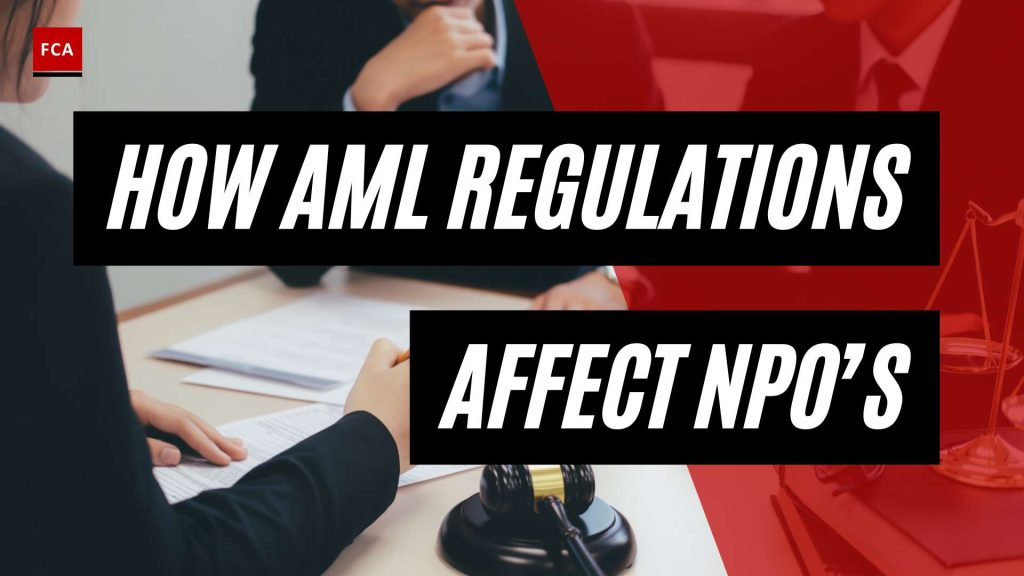Understanding AML Regulations
To combat the risks of money laundering and terrorist financing, Anti-Money Laundering (AML) regulations have been established worldwide. These regulations aim to prevent individuals and organizations from using financial systems for illicit purposes. While initially focused on financial institutions, AML regulations also impact non-profit organizations (NPOs). This section will provide an overview of AML/CFT (Countering the Financing of Terrorism) measures, discuss the risks faced by NPOs, and highlight the challenges they encounter in AML/CFT compliance.
Overview of AML/CFT Measures
AML/CFT measures are a set of policies, procedures, and controls designed to identify and prevent money laundering and terrorist financing activities. They require entities to implement robust due diligence processes, maintain accurate records, and report suspicious transactions. These measures help ensure the integrity of the financial system and protect against illicit activities.
Risks Faced by Non-Profit Organizations (NPOs)
NPOs face inherent risks of abuse for terrorist financing and money laundering purposes. The complex nature of the sector, its diverse activities, and global reach make it susceptible to exploitation by criminals. NPOs may unknowingly receive funds derived from illegal activities, making them vulnerable to exploitation by money launderers and terrorist financiers (CPA Canada). Regulators recognize the need to include NPOs in AML and CTF regulations to safeguard the sector against these risks (CPA Canada).
Challenges in AML/CFT Compliance for NPOs
NPOs encounter specific challenges in complying with AML/CFT regulations. Inadequate understanding of AML/CFT requirements among NPOs, deficiencies in their compliance programs, and limited resources pose significant challenges. The diverse nature of NPOs and their involvement in high-risk jurisdictions further contribute to the complexity of implementing effective AML/CFT measures (FATF). Addressing these challenges is crucial to ensure that NPOs can effectively contribute to society while mitigating the risk of being misused for illicit purposes.
Understanding AML regulations is essential for NPOs to navigate the complexities of compliance. By tailoring AML/CFT measures for NPOs, conducting thorough risk assessments, and enhancing transparency and accountability, NPOs can play their part in mitigating the risks associated with money laundering and terrorist financing. In the following sections, we will delve deeper into the impact of AML regulations on NPOs and explore effective measures to address AML/CFT challenges in the sector.
Impact of AML Regulations on NPOs
As regulators intensify their focus on Anti-Money Laundering and Countering the Financing of Terrorism (AML/CFT) measures, non-profit organizations (NPOs) are facing the impact of these regulations. It is crucial for NPOs to understand the tailored AML/CFT measures applicable to them, the importance of conducting risk assessments, and the need to enhance transparency and accountability within their operations.
Tailored AML/CFT Measures for NPOs
Recognizing the vulnerability of NPOs to abuse for illicit financing purposes, there is a growing recognition globally for the need to implement tailored AML/CFT measures within the sector (FATF). These measures aim to mitigate the risks faced by NPOs and ensure compliance with AML regulations.
Tailored AML/CFT measures for NPOs involve several key components. Firstly, NPOs should conduct thorough risk assessments to identify and assess the potential money laundering and terrorist financing risks associated with their activities. This allows NPOs to develop appropriate risk mitigation strategies and implement targeted controls.
Secondly, NPOs must recognize the importance of due diligence procedures for donations and funding sources. Implementing robust due diligence processes helps to ensure that funds received by NPOs are from legitimate sources and are not associated with illicit activities.
Lastly, enhancing transparency and accountability is crucial in combatting abuse in the NPO sector. NPOs should maintain accurate and up-to-date records of their financial transactions, governance structures, and activities. This transparency allows regulators and stakeholders to monitor the flow of funds and ensure compliance with AML regulations.
Importance of Risk Assessments for NPOs
Risk assessments play a vital role in the effective implementation of AML/CFT measures for NPOs. By conducting risk assessments, NPOs can identify and evaluate the specific risks they face, allowing them to allocate resources and implement appropriate controls accordingly.
Risk assessments enable NPOs to understand the vulnerabilities within their operations, such as potential high-risk activities or transactions. This knowledge empowers NPOs to develop risk mitigation strategies tailored to their unique circumstances.
Through risk assessments, NPOs can identify gaps in their compliance programs and take necessary steps to address them. This proactive approach helps to strengthen their AML/CFT frameworks and demonstrates a commitment to preventing abuse for illicit financing purposes.
Enhancing Transparency and Accountability
Transparency and accountability are essential elements in AML/CFT compliance for NPOs. By maintaining transparency, NPOs provide regulators, donors, and other stakeholders with visibility into their financial operations and activities.
NPOs should adopt sound governance practices, including proper financial recordkeeping and reporting mechanisms. This ensures that funds are utilized for their intended charitable purposes and are not diverted for illicit activities. Regular internal and external audits can further enhance transparency and accountability within the organization.
Additionally, NPOs should engage in dialogue and cooperation with regulators, governments, and other relevant stakeholders. This collaborative approach fosters a deeper understanding of the unique challenges faced by NPOs and enables the development of effective AML/CFT measures that strike a balance between regulatory compliance and the pursuit of charitable objectives.
In conclusion, the impact of AML regulations on NPOs necessitates the implementation of tailored AML/CFT measures, conducting comprehensive risk assessments, and enhancing transparency and accountability within NPO operations. By embracing these measures, NPOs can contribute to the collective effort of preventing abuse for illicit financing purposes while continuing to fulfill their charitable missions.
Addressing Challenges in AML/CFT Compliance
Complying with Anti-Money Laundering (AML) and Countering the Financing of Terrorism (CFT) regulations can present unique challenges for non-profit organizations (NPOs). To effectively address these challenges, NPOs must focus on capacity-building and training, adopt a collaborative approach with stakeholders, and develop robust policies and controls.
Capacity-Building and Training for NPOs
One of the key challenges faced by NPOs in AML/CFT compliance is the inadequate understanding of AML/CFT requirements and limited resources for implementing necessary measures. To overcome these challenges, organizations should prioritize capacity-building and training initiatives.
Capacity-building programs can provide NPOs with the knowledge and skills required to implement effective AML/CFT measures. Training sessions can cover topics such as risk assessment, due diligence processes for donations, monitoring of activities, and the implementation of internal controls. By investing in training programs, NPOs can enhance their ability to prevent potential abuse for illicit financing purposes.
Collaborative Approach with Stakeholders
Addressing the challenges of AML/CFT compliance for NPOs requires a collaborative effort involving governments, regulatory authorities, NPOs themselves, and other relevant stakeholders. By working together, these entities can develop a comprehensive approach to combat the abuse of NPOs for money laundering and terrorist financing.
Collaboration with stakeholders allows for the sharing of information, best practices, and experiences. It facilitates the establishment of effective communication channels, enabling NPOs to stay informed about regulatory updates and emerging risks. By fostering collaboration, NPOs can benefit from the expertise and guidance of regulatory authorities and industry professionals, enhancing their ability to comply with AML/CFT regulations.
Developing Robust Policies and Controls
To mitigate the risks of money laundering and terrorist financing, NPOs should develop robust policies and controls tailored to their specific circumstances. These policies and controls should be designed to prevent potential abuse and ensure compliance with AML/CFT regulations.
Key elements of robust policies and controls include conducting risk assessments to identify and assess the specific risks faced by the organization, implementing due diligence processes for donations and funding sources, monitoring activities to detect suspicious transactions, and enhancing transparency and accountability within the organization. By implementing these measures, NPOs can demonstrate their commitment to preventing illicit financing activities and safeguarding their reputation.
It is essential for NPOs to align their policies and controls with the risk-based approach recommended by regulatory authorities. This approach ensures that organizations allocate their resources effectively, focusing on higher-risk areas to prevent abuse while avoiding undue burdens that could hinder their legitimate activities.
By addressing the challenges of AML/CFT compliance through capacity-building and training, collaboration with stakeholders, and the development of robust policies and controls, NPOs can strengthen their AML/CFT frameworks and contribute to the overall integrity of the non-profit sector.
NPOs and Access to Financial Services
Non-profit organizations (NPOs) often encounter difficulties in accessing financial services due to the impact of Anti-Money Laundering and Countering the Financing of Terrorism (AML/CFT) regulations. These challenges can lead to financial exclusion and hinder the ability of NPOs to fulfill their missions effectively. It is important to address the following issues that affect NPOs:
De-Risking and Financial Exclusion
The concept of “de-risking” has emerged within the financial industry, where banks avoid working with sectors deemed to carry higher risks, such as NPOs. This approach aims to reduce compliance costs and the risk of fines for non-compliance. However, it can result in NPOs being categorized as “high-risk customers” without considering their actual risk profiles. Consequently, many NPOs face difficulties in establishing or maintaining banking relationships. This phenomenon of de-risking contributes to financial exclusion for NPOs, making it challenging for them to access essential financial services and carry out their legitimate activities (European Center for Not-for-Profit Law).
Misunderstandings of NPO Activities
Financial institutions often apply a blanket approach to compliance with AML/CFT regulations, which can lead to misunderstandings of NPO activities. This approach creates barriers for legitimate NPO funding and results in the stigmatization of NPOs. The lack of differentiation between various types of NPOs and their diverse activities can impede their ability to access financial services. It is crucial to recognize that NPOs operate for charitable, humanitarian, and developmental purposes, and their funding sources and activities are distinct from those involved in illicit finance (European Center for Not-for-Profit Law).
Lack of Understanding Among Banks and Policymakers
A lack of understanding and education among banks and policymakers about the nature and operations of NPOs contributes to the challenges faced by these organizations in navigating AML/CFT regulations when accessing financial services. This lack of comprehension can result in NPOs being subject to more stringent due diligence requirements and facing greater difficulties in establishing banking relationships. It is essential to bridge this knowledge gap to ensure a better understanding of the low-risk nature of many NPOs and their importance in addressing societal needs (European Center for Not-for-Profit Law).
To address these challenges and promote financial inclusion for NPOs, collaboration between NPOs, regulatory authorities, and financial institutions is crucial. This collaborative approach can help to find effective solutions that balance the objectives of preventing financial crimes with supporting the legitimate activities of NPOs. By working together, stakeholders can develop a better understanding of the unique characteristics and risk profiles of NPOs, leading to a more tailored and informed approach to AML/CFT compliance for these organizations.
Effective AML/CFT Measures for NPOs
To address the unique challenges faced by non-profit organizations (NPOs) in complying with Anti-Money Laundering (AML) and Combating the Financing of Terrorism (CFT) regulations, it is crucial to implement effective measures tailored specifically to their needs. This section explores three key aspects of effective AML/CFT measures for NPOs: a risk-based approach, implementing tailored controls, and collaboration for effective risk assessment.
Risk-Based Approach to NPOs
A risk-based approach is fundamental when considering AML/CFT measures for NPOs. It involves understanding the individual risks associated with each NPO, considering factors such as size, geographical reach, type of activities, and clientele. By conducting thorough risk assessments, financial institutions and regulatory authorities can determine the level of money laundering and terrorist financing risks posed by NPOs (CPA Canada). This approach enables the implementation of proportionate and targeted AML/CFT controls based on the risk profile of each NPO.
Implementing Tailored Controls
Tailoring controls specific to the NPO sector is crucial for effective AML/CFT compliance. Controls should be designed to mitigate the identified risks and prevent potential abuse for illicit financing purposes. Some key controls that NPOs can implement include:
-
Due diligence processes for donations: Conducting due diligence on donors and ensuring transparency in the donation process can help identify and prevent potential risks. This includes verifying the source of funds and conducting Know Your Donor (KYD) checks to ensure the legitimacy of donations.
-
Monitoring of activities: Implementing robust monitoring systems allows NPOs to detect suspicious transactions or activities that may indicate money laundering or terrorist financing. Regular monitoring helps identify anomalies and triggers further investigation as necessary.
-
Internal controls: Creating and implementing internal controls within NPOs helps establish a framework for ensuring compliance with AML/CFT regulations. This includes policies and procedures for financial management, record-keeping, and reporting suspicious transactions.
-
Enhancing transparency and accountability: Promoting transparency and accountability within NPOs helps build trust and prevent potential abuse. This can be achieved through transparent financial reporting, disclosure of activities, and adherence to good governance practices.
Collaboration for Effective Risk Assessment
Collaborative efforts between NPOs, regulatory authorities, financial institutions, and other relevant stakeholders play a crucial role in developing a comprehensive approach to address the challenges of abuse in the sector. By working together, these entities can share knowledge, expertise, and best practices, which aids in effective risk assessment, implementation of appropriate controls, and preservation of the reputation and trust within the non-profit sector (FATF). Collaboration ensures a coordinated and unified response to money laundering and terrorist financing risks, creating a strong defense against illicit activities.
By adopting a risk-based approach, implementing tailored controls, and fostering collaboration, NPOs can enhance their AML/CFT compliance efforts. These measures not only help mitigate the risks associated with money laundering and terrorist financing but also reinforce the integrity and credibility of the non-profit sector as a whole. It is essential for NPOs to remain vigilant, adapt to evolving regulatory requirements, and continuously strengthen their AML/CFT measures to protect their organizations and uphold their mission in promoting positive social impact.
The Importance of AML/CFT in NPOs
Non-profit organizations (NPOs) play a vital role in society, working towards charitable causes and social impact. However, their activities also make them vulnerable to abuse for illicit purposes. Recognizing this, Anti-Money Laundering and Countering the Financing of Terrorism (AML/CFT) regulations have been implemented to mitigate these risks and ensure the integrity of the non-profit sector.
Vulnerability to Abuse for Illicit Purposes
NPOs face inherent risks due to their structure, function, and financial transactions. Criminals may exploit these vulnerabilities to launder money or finance terrorism. These risks can arise from factors such as the lack of transparency, weak internal controls, and the complexity of the international NPO sector (FATF). It is essential to implement robust AML/CFT measures to safeguard NPOs from being misused for illicit purposes.
Case Studies Demonstrating Risks
Numerous case studies highlight the risks faced by NPOs in terms of money laundering and terrorist financing. These cases involve instances where NPOs have unknowingly or intentionally been exploited for illicit activities. While the majority of NPOs operate with integrity and adhere to ethical standards, these cases emphasize the need for vigilance and effective AML/CFT measures to prevent abuse within the non-profit sector.
Balancing Regulation and Charitable Activities
Balancing regulatory requirements with the charitable activities of NPOs is a delicate task. Striking the right balance is crucial to ensure that legitimate NPOs can continue their essential work while also safeguarding against the risks of money laundering and terrorist financing. Effective AML/CFT measures should be proportionate, tailored to the specific risks faced by NPOs, and avoid unnecessary burdens that may hinder their charitable activities.
To achieve this balance, regulators, policymakers, and NPOs themselves must work collaboratively to develop and implement effective AML/CFT frameworks. This collaborative approach ensures that the unique characteristics and challenges of the non-profit sector are taken into account, enabling NPOs to fulfill their missions while maintaining compliance with AML/CFT regulations.
By recognizing the vulnerability of NPOs to abuse for illicit purposes, studying case studies that demonstrate the risks, and striking the right balance between regulation and charitable activities, stakeholders can develop comprehensive AML/CFT measures that protect the integrity of the non-profit sector. This approach promotes transparency, accountability, and the continued ability of NPOs to make a positive impact in communities around the world.









